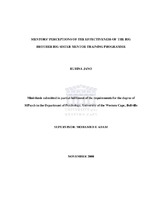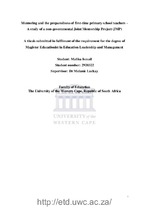The relationship between transformational leadership, trust and peer mentoring: An exploratory study of the Peer Mentoring Programme at the University of the Western Cape.
Abstract
Transformational leadership has received considerable attention within the organizational sphere in the last decade. Leadership in higher education institutions has also received attention as there is a concern about the retention rates of students. Academic leaders have identified unclear educational goals, dissatisfaction with academic programmes, and unclear career objectives as reasons for student attrition. Therefore, skills training and development programmes became the priority of academic institutions for the purpose of retaining students to sustain a competent and efficient workforce generation in all spheres. The University of the Western Cape’s Peer Mentoring Programme offers a strategy to increase retention of students because it addresses several causes of student drop out such as, inadequate academic preparation for tertiary institutions, lack of knowledge about social or academic resources and adapting to new surroundings for first year students. Based on a review of empirical findings, this research elucidated the theoretical terrain of mentoring, transformational leadership and trust. The exploration of the literature highlighted the similarities and differences between transformational leaders and mentors are discussed. An adapted version of the Multifactor leadership questionnaire (MLQ), and the workplace trust survey (WTS) was administered to a sample of 54 mentors in a university’s peer mentoring programme within the Western Cape South Africa. The University of the Western Cape’s peer mentoring programme (PMP) was utilised as a case study and a convenience sampling approach was employed. The results emanating from this research indicate that there is a significant relationship between transformational leadership and trust. Biographical variables namely gender, age and previous experience within the mentoring programme as a follower (mentor) were examined amongst the sample of PMP to determine if any of the variables contributed towards the differences in perceptions of transformational leadership and trust in the leader (head mentor). These biographical variables demonstrated no significant difference in transformational and trust levels. Notwithstanding the limited generalizability of this study, implications for research and practice are suggested and recommendations are made to facilitate improved functioning of the PMP.
Related items
Showing items related by title, author, creator and subject.
-
Exploring the relationship between work and learning within small business development
Lombard, Ferdinand Anthony (2009)Continuous learning has been identified as a key element for SMMEs to succeed in their drive to build productive capacity, to compete, to create jobs and to contribute to poverty alleviation in South Africa. Without the ... -
"Mentors' perception of the effectiveness of the Big Brother Big Sister mentor training programme"
Jano, Rubina (University of the Western Cape, 2008)Mentoring has gained a great deal of popularity across various professional fields and disciplines over the past few years. More recently, planned mentoring has become an important form of intervention with young people ... -
Mentoring and the preparedness of first-time primary school teachers - A study of a non-governmental Joint Mentorship Project (JMP)
Ismail, Malika (University of the Western Cape, 2019)When a first-time teacher graduate and start working in a school, the first-time teacher is expected to adapt and adjust to the demands of a daily teaching programme (Carter & Francis, 2001). This can be overwhelming by ...




